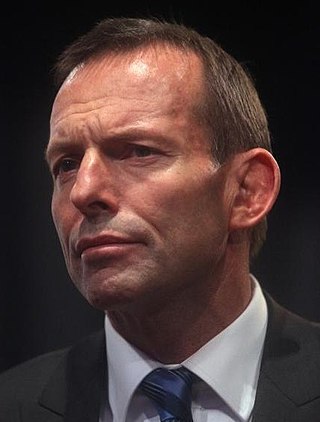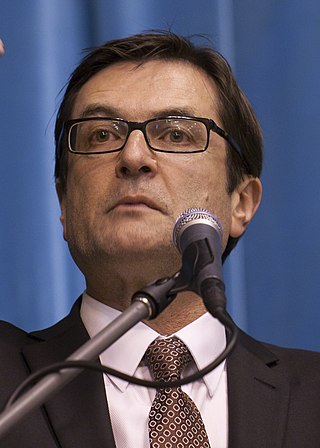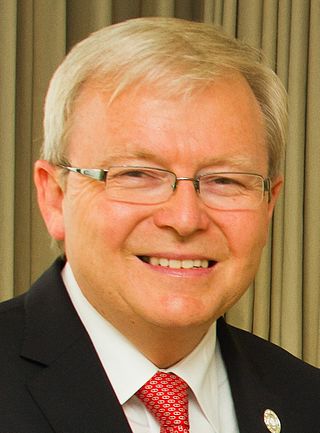Paul John Kelly is an Australian political journalist, author and television and radio commentator from Sydney. He has worked in a variety of roles, principally for The Australian newspaper and is currently its editor-at-large. Kelly also appears as a commentator on Sky News Australia and has written seven books on political events in Australia since the 1970s including on the 1975 Australian constitutional crisis. Recent works include The March of Patriots, which chronicles the creation of a modern Australia during the 1991–2007 era of prime ministers, Paul Keating and John Howard, and Triumph & Demise which focuses on the leadership tensions at the heart of the Rudd-Gillard Labor governments of 2007 to 2011. Kelly presented the Australian Broadcasting Corporation (ABC) TV documentary series 100 Years – The Australian Story (2001) and wrote a book of the same title.

Kevin Michael Rudd is an Australian diplomat and former politician who served as the 26th prime minister of Australia from 2007 to 2010 and June to September 2013. He held office as the leader of the Labor Party (ALP) and was the member of parliament (MP) the Queensland division of Griffith from 1998 to 2013. Since 2023, Rudd has been the ambassador of Australia to the United States.

Julia Eileen Gillard is an Australian former politician who served as the 27th prime minister of Australia from 2010 to 2013. She held office as leader of the Australian Labor Party (ALP) and was the member of parliament (MP) for the Victorian division of Lalor from 1998 to 2013. She previously served as the 13th deputy prime minister of Australia from 2007 to 2010, under Kevin Rudd. She is the first and only woman to hold either office in Australian history.

Anthony John Abbott is an Australian former politician who served as the 28th prime minister of Australia from 2013 to 2015. He held office as the leader of the Liberal Party of Australia and was the member of parliament (MP) for the New South Wales division of Warringah from 1994 to 2019.

Wayne Maxwell Swan is an Australian politician serving as the 25th and current National President of the Labor Party since 2018, previously serving as the 14th deputy prime minister of Australia and the deputy leader of the Labor Party from 2010 to 2013, and the treasurer of Australia from 2007 to 2013.

Gregory Ivan Combet is the chairman of Australia’s sovereign wealth fund, the Future Fund. Prior to this he served as chair of the Australian Government Net Zero Economy Agency, overseeing the economic transformation from fossil fuels to renewable energy and net zero emissions.
Faceless men is a term from Australian politics. The term is generally used to refer to men and women who exert political influence and are not elected representatives to state, territory or federal legislative bodies, yet are elected representatives to bodies that determine political party policies. However, the political tactic of elected representatives canvassing party members for support on policies varies widely amongst Australian political parties.
In Australian politics, a leadership spill is a declaration that the leadership of a parliamentary party is vacant and open for contest. A spill may involve all or some of the leadership positions. Where a rival to the existing leader calls for a spill it may also be called a leadership challenge. When successful, it is often said that the former leader has been "rolled". In Australian English the colloquial use of the word "spill" seems to have begun in the mid-1940s with the contest to replace Prime Minister John Curtin after his death on 5 July 1945.

Several surveys of academics and the general public have been conducted to evaluate and rank the performance of the prime ministers of Australia.

A leadership spill occurred in the Australian Labor Party on 24 June 2010. Kevin Rudd, the prime minister of Australia, was challenged by Julia Gillard, the deputy prime minister of Australia, for the leadership of the Australian Labor Party. Gillard won the election unopposed after Rudd declined to contest, choosing instead to resign. Gillard was duly sworn in as prime minister by Quentin Bryce, the Governor-General, on 24 June 2010 at Government House, becoming Australia's first female prime minister.

The First Gillard ministry (Labor) was the 65th ministry of the Australian Government and was led by the prime minister, Julia Gillard. It succeeded the first Rudd ministry upon its swearing in by the Governor-General of Australia, Quentin Bryce, on 24 June 2010. It was replaced by the second Gillard ministry on 14 September 2010 after the 2010 election.

The Gillard government was the Government of Australia led by the 27th prime minister of Australia, Julia Gillard, of the Australian Labor Party. The Gillard government succeeded the first Rudd government by way of the Labor Party leadership spill, and began on 24 June 2010, with Gillard sworn in as prime minister by the governor-general of Australia, Quentin Bryce. The Gillard government ended when Kevin Rudd won back the leadership of the Australian Labor Party on 26 June 2013 and commenced the second Rudd government.

The 2013 Australian federal election to elect the members of the 44th Parliament of Australia took place on Saturday 7 September 2013. The centre-right Liberal/National Coalition opposition led by Opposition leader Tony Abbott of the Liberal Party of Australia and Coalition partner the National Party of Australia, led by Warren Truss, defeated the incumbent centre-left Labor Party government of Prime Minister Kevin Rudd in a landslide. It was also the third time in history that a party won 90 or more seats at an Australian election. Labor had been in government for six years since being elected in the 2007 election. This election marked the end of the Rudd-Gillard-Rudd Labor government and the start of the 9 year long Abbott-Turnbull-Morrison Liberal-National Coalition government. Abbott was sworn in by the Governor-General, Quentin Bryce, as Australia's new Prime Minister on 18 September 2013, along with the Abbott Ministry. The 44th Parliament of Australia opened on 12 November 2013, with the members of the House of Representatives and territory senators sworn in. The state senators were sworn in by the next Governor-General Peter Cosgrove on 7 July 2014, with their six-year terms commencing on 1 July.

The Clean Energy Act 2011 was an Act of the Australian Parliament, the main Act in a package of legislation that established an Australian emissions trading scheme (ETS), to be preceded by a three-year period of fixed carbon pricing in Australia designed to reduce carbon dioxide emissions as part of efforts to combat global warming.

A leadership spill in the Australian Labor Party, the party of government in the Parliament of Australia, was held on 27 February 2012 at 10 am AEDT, followed by a ballot. The Prime Minister, Julia Gillard, announced the spill at a press conference on 23 February 2012, following the resignation of the Minister for Foreign Affairs, Kevin Rudd, from his cabinet position after months of speculation that he intended to challenge Gillard for the leadership. Rudd announced his intention to seek the leadership at a press conference on 24 February.

A leadership spill in the Australian Labor Party, the party then forming the Government of Australia, took place on 26 June 2013 at 7:00pm AEST. Prime Minister Julia Gillard called a ballot for Leader and Deputy Leader of the Labor Party live on Sky News Australia at 4:00pm, following persistent leadership tensions. She stated that she would retire from politics if she lost the vote, while calling on any would-be challengers to pledge to do the same if they lost. In a press conference held shortly after Gillard's announcement, backbencher and former Prime Minister Kevin Rudd announced that he would challenge Gillard, whilst also pledging to step down if he did not win the vote. At the ALP caucus meeting, Rudd was elected Leader of the Labor Party, with the caucus voting 57–45 in his favour.

The second Rudd ministry (Labor) was the 67th ministry of the Australian government, led by Prime Minister Kevin Rudd. It succeeded the second Gillard ministry after a leadership spill within the Australian Labor Party that took place on 26 June 2013. Three members of the ministry were sworn in by Governor-General Quentin Bryce on 27 June 2013. These were Kevin Rudd, Prime Minister; Anthony Albanese, Deputy Prime Minister; and Chris Bowen, Treasurer. The remainder of the ministry were sworn in on 1 July 2013.

The second Rudd government was the federal executive Government of Australia led by Prime Minister Kevin Rudd of the Australian Labor Party. It commenced on 27 June 2013 and ceased on 18 September 2013. Rudd had previously served a term as Prime Minister from 2007 to 2010 and been replaced by his deputy Julia Gillard, following an internal party spill. Rudd regained the Labor Party leadership by successfully re-challenging Gillard in a June 2013 party spill. On 5 August, Rudd called an election for 7 September 2013, which resulted in the defeat of his government by the Liberal/National Coalition led by Opposition Leader Tony Abbott.

My Story is a political memoir of Julia Gillard, who served as the 13th Deputy Prime Minister of Australia from 2007 to 2010, and then the 27th Prime Minister of Australia from 2010 to 2013. She is the first, and to date, only woman to serve in either position. Published in 2014 by Random House Australia, My Story reflects on various personal aspects of her life and career, including her own analysis of the people and key players of the Rudd-Gillard governments (2007–2013).
Kerry-Anne Walsh is an Australian author, former journalist and political commentator. She is also the author of the award-winning book, The Stalking of Julia Gillard. She also wrote another book, Hoodwinked: How Pauline Hanson Fooled a Nation.












